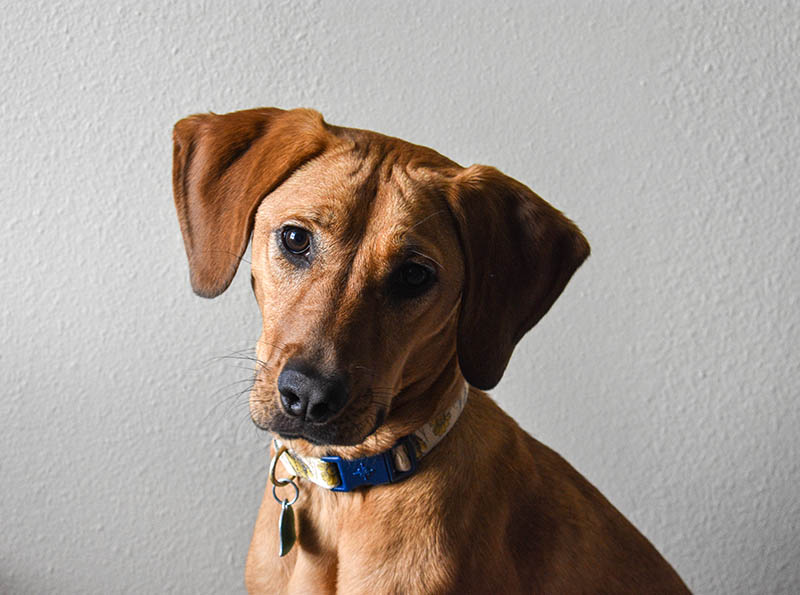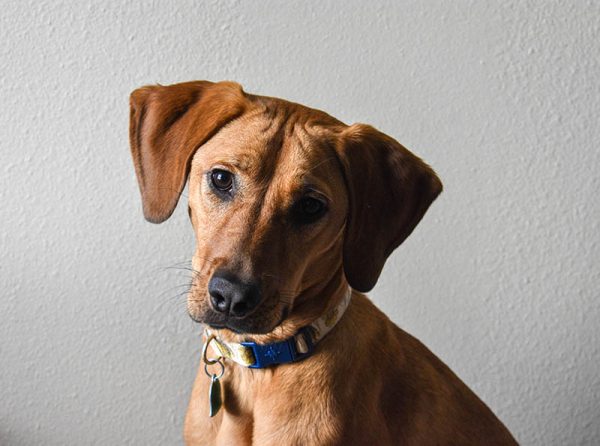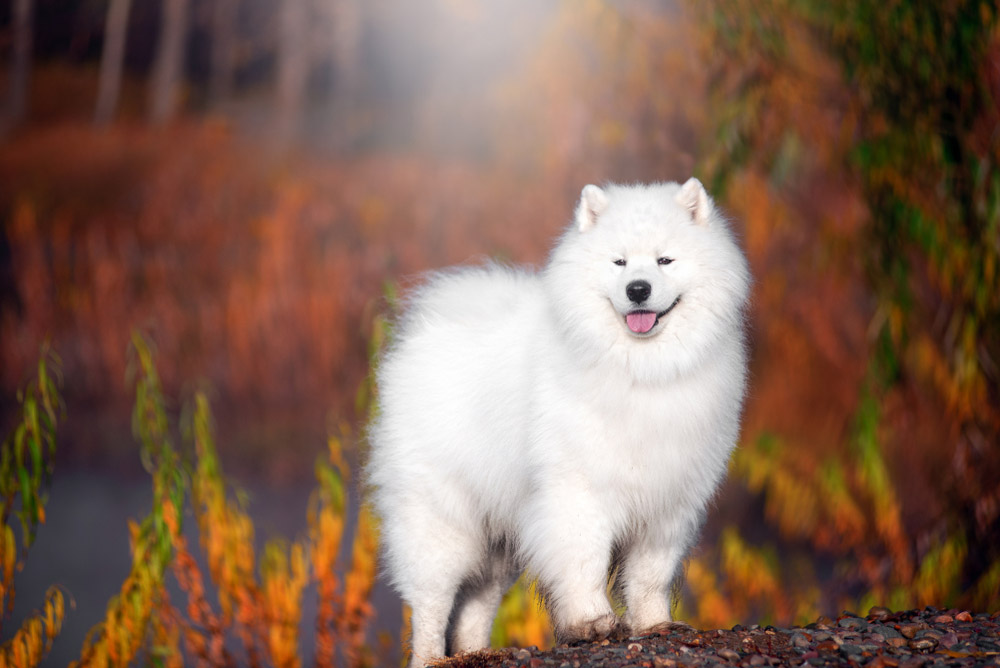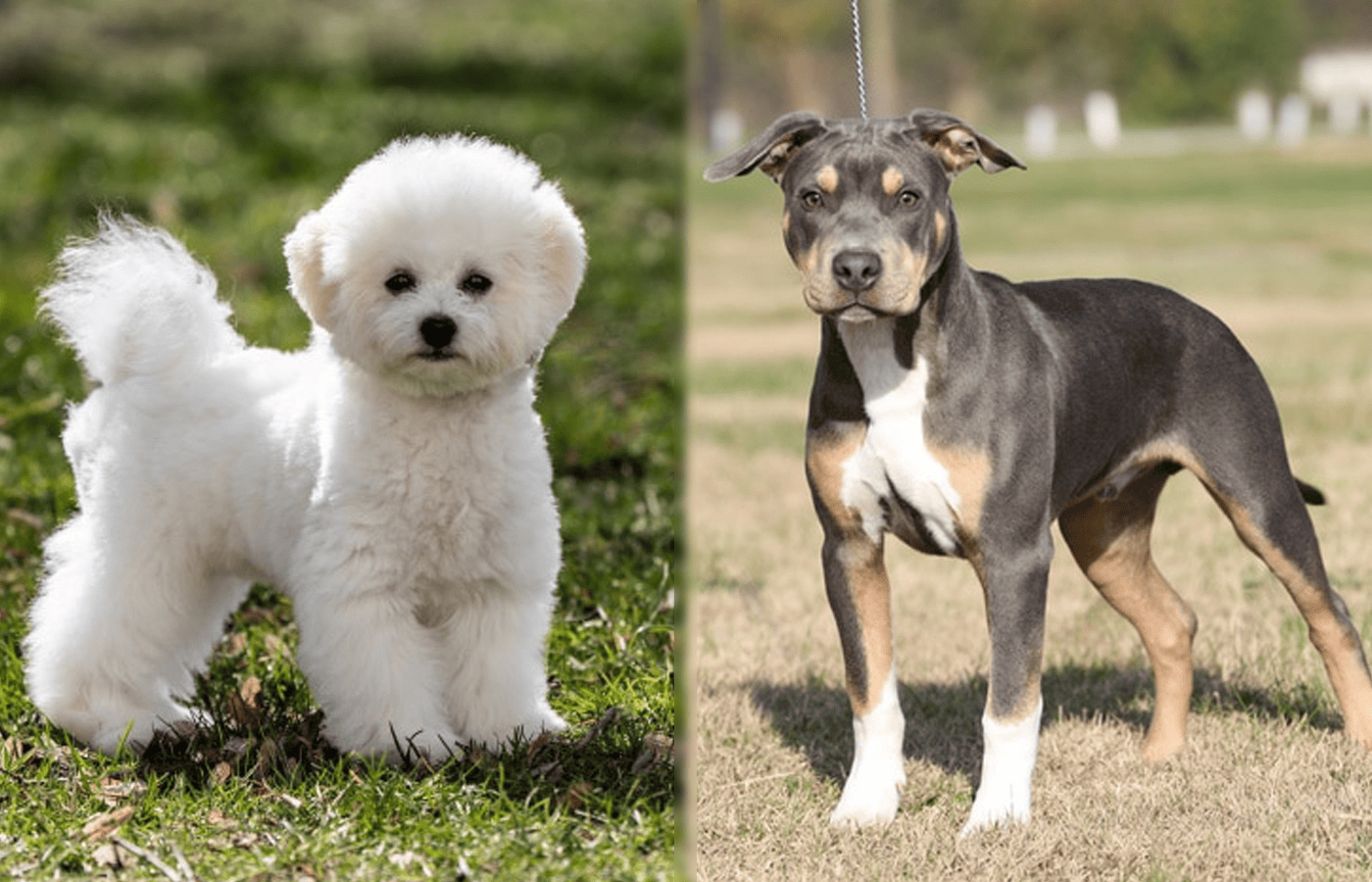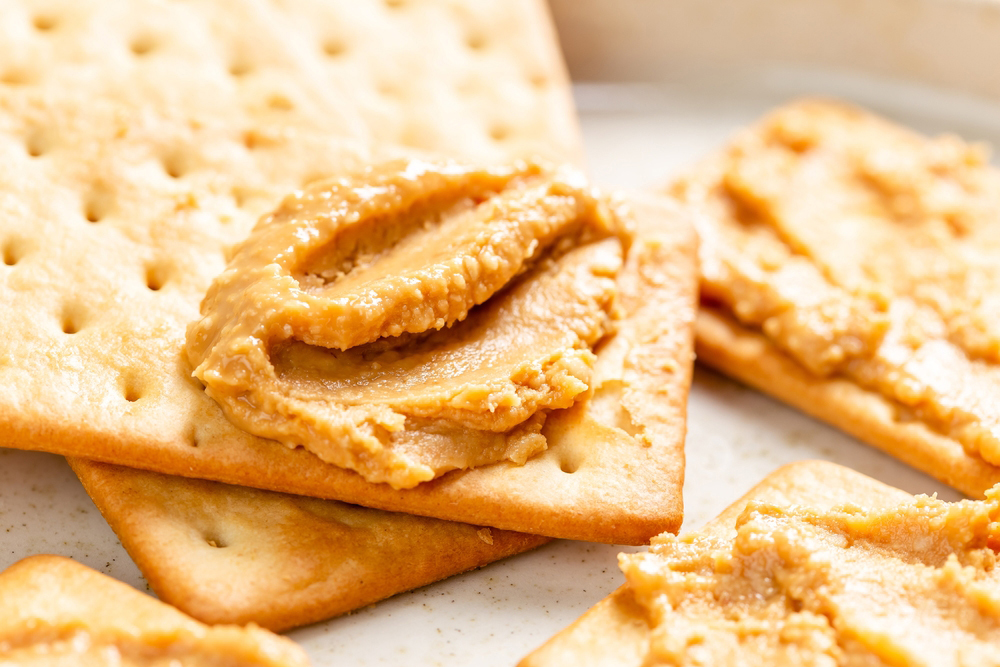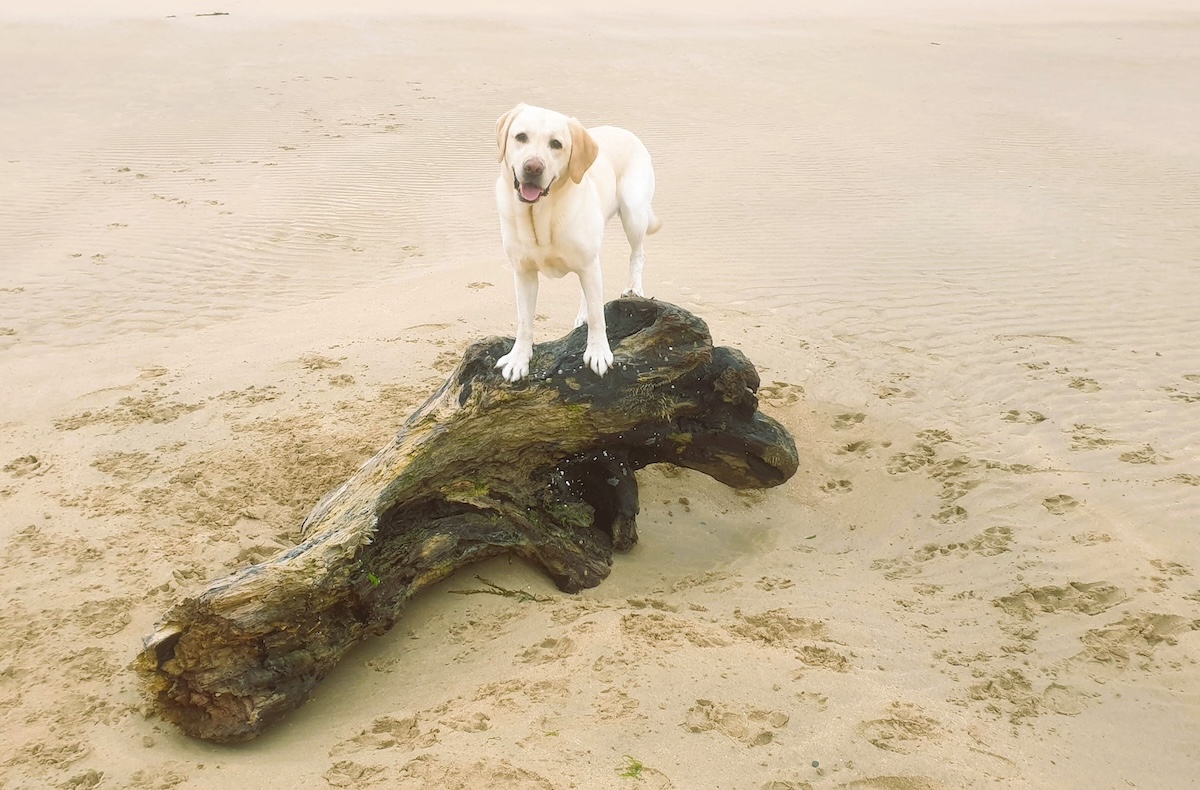Click Below to Skip Ahead
Loyal, intelligent, agile, and well-built, German Shepherds are the pride and joy of the canine world. Bloodhounds, in turn, are widely recognized as one of the best search-and-rescue dogs, capable of tracking a scent from the other side of town. On top of that, these buds are friendly, affectionate, and happy to be around humans. As for the German Shepherd Bloodhound Mix, it gets the best of both worlds and can be a near-perfect pet in the right hands.
Breed Overview
Height:
23–27 inches
Weight:
50–110 pounds
Lifespan:
10–14 years
Colors:
Black, black and white, brown, liver, tan, silver, red
Suitable for:
Families with adult kids, single owners, seniors
Temperament:
Faithful, smart, quick to follow commands, open-hearted, cheerful
The Shepherd Bloodhound Mix is just as witty and courageous as Germany’s finest and has the nose of an elite sleuth. Energetic, socially active, and ready to take on tough work, this joyful doggo is nothing short of a miracle. But just how safe is it around other animals and children? What kind of food does it like? How do you exercise this crossbreed to tame its stubborn, standoffish temperament? Join us, and let’s find the answers together!
German Shepherd Bloodhound Mix Characteristics

German Shepherd Bloodhound Mix Puppies
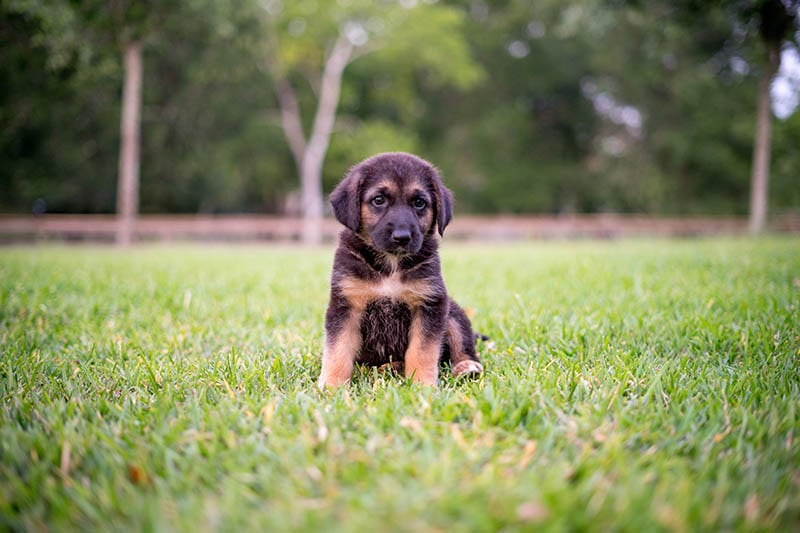
Mixed dogs are rarely bred on a large scale, which is why they’re not as widespread as purebreds. So, don’t be discouraged if you don’t see any German Shepherd Bloodhound Mix dogs at a local animal shelter or rescue organization center. Talk to the staff members: they might tell you about a shelter in the area that has Bloodhound Shepherds. Sadly, crossbreeds are often abandoned, but in this case, that can be a good thing.
Your chances of getting a rare pooch like that will be higher with breeders. However, before making a payment and signing the papers, ask to take a quick look at the parents. Also, don’t be shy to request medical records of the mom and dad to make sure the pup is healthy. And one more thing: if the litter isn’t getting timely vaccinations and anti-tick/flea treatment, we would recommend against adopting a dog there. As for spaying/neutering, consult with a vet before doing it.
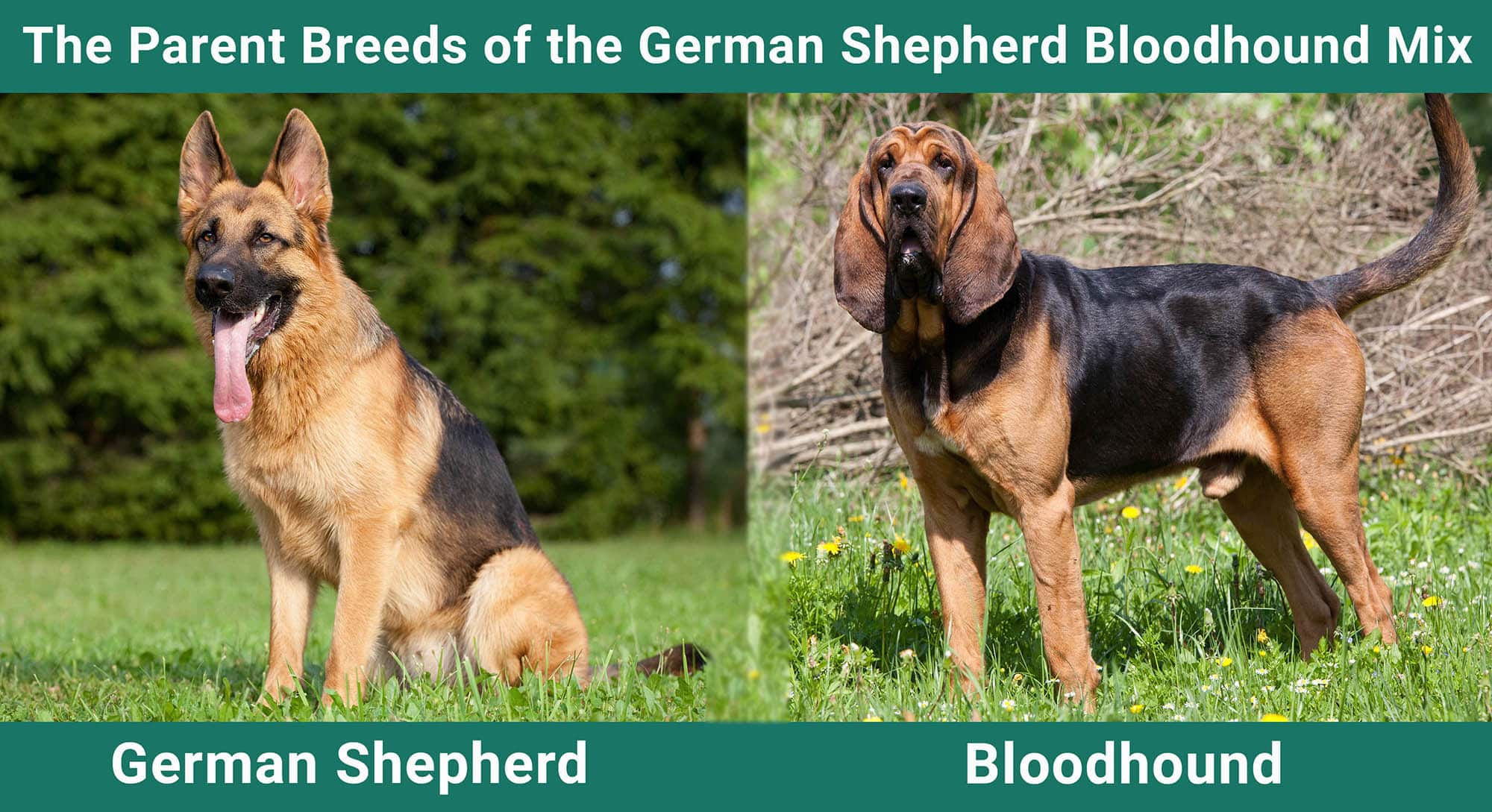
Temperament & Intelligence of the German Shepherd Bloodhound Mix
Just like its parent breeds, the German Shepherd Bloodhound Mix is a well-mannered, even-tempered, and independent doggo that doesn’t need you to babysit it. While it will get restless when left alone for a day or two, for the most part, this champ is peaceful, quiet, and doesn’t mind turning into a couch potato. With that, it’s energetic, affectionate, and curious and can lose track of time when chasing after a new scent.
German Shepherd Bloodhound Mix dogs are extremely smart and don’t take forever to learn tricks or follow commands. Now, Bloodhounds aren’t the best watchdogs out there, but if your mixed breed gets its genes from the other parent, you’ll get yourself a fearless and formidable protector. More good news: these canines are loyal to the bitter end, and once they start trusting a human owner, it’s for life!
Are These Dogs Good for Families?
Witty, affectionate, and charming, German Shepherd Bloodhounds are a great choice for a big family with adult children. Loyalty is something these dogs take very seriously! Also, please remember that, like any other energetic and intelligent doggo, this crossbreed needs at least 1–1.5 hours of play/exercise time per day. Active families that like to spend time with a furry bud both indoors and outdoors will be pleased to hear that.
Seniors and single owners will also find these dogs to be worthy companions. This is important: as long as you let the pet enjoy nature for about an hour a day, it won’t feel cramped up, lonely, or anxious in an apartment. Both Shepherds and Bloodhounds were bred to work hard and hunt outdoors, yet they won’t cause you any trouble in a small house, condo, or apartment. You might get a bark or two, but that’s about it.
What About Little Children?
If you have kids and want to adopt a dog, the German Shepherd Bloodhound Mix will be a solid pick. Bloodhounds can get easily frustrated at times, but they’re highly tolerant toward children. As for German Shepherds, they are even more affectionate and have patience for days. Shepherds genuinely enjoy the company of humans (adults or toddlers, strangers, or family members).
This doesn’t mean supervision won’t be needed, though. On the contrary, make sure you’re always there, watching over the pet and the kids as they’re playing. Leaving a big and ponderous beast like the Shepherd Bloodhound one-on-one with little children might end badly. But, with early socialization, you can teach both parties how to interact with each other and become best of friends.
Does This Breed Get Along With Other Pets?
The short answer is no, not particularly. Since these dogs are protective and territorial, they’re not very trusting around other animals. Depending on the situation, they can be standoffish or all-out aggressive, especially when facing other dogs or cats. Again, socialization at an early age is how you turn an overzealous giant into a friendly and trusting champ. Unfortunately, if you adopt a fully grown dog, it will take more effort to discipline it and control the prey drive.

Things to Know When Owning a German Shepherd Bloodhound Mix:
Food & Diet Requirements
The Shepherd/Bloodhound mixed breed is an imposing dog with a healthy appetite and a love for the outdoors. So, make sure to feed it premium-quality food that’s rich in proteins, fats, vitamins, and minerals. Avoid filler ingredients, especially if you have a pup. Younger dogs need lots of protein that comes from real meat for proper muscle, bone, and joint growth. The food can be commercial or home-cooked—it’s up to you.
But speak to a veterinarian first, as they’ll tell you what to look for when navigating through dog food products online or at a local store. Animal doctors can also help set the right calorie limit for the day depending on the dog’s age, weight, sex, activity level, and other factors. This way, the pet will get its fair share of food per day while staying fit and avoiding obesity. Oh, and don’t forget to get the dog a bowl of fresh water!
Exercise
German Shepherd Bloodhound dogs like nothing more than to join their owners on a morning stroll. Or it can be a short walk if it’s a little boy or girl. Agile, athletic, and enduring, they need to be exercised both physically and mentally to live meaningful, happy lives. Otherwise, you’ll get an anxious, depressed, and maybe even destructive doggo on your hands. These buds shouldn’t be left off the leash in public spaces, though.
No matter how well-socialized and trained the canine is, it might give in to primal instincts at any moment. We’re talking about chasing a scent, another dog, or a smaller mammal like a cat or a rabbit. On average, 1–2 hours of exercise per day will be enough regardless of which parent the pouch takes after.
Training
So, how do you train this dog? Should you be a tough handler or keep the pup’s spirit up with treats? Here’s the deal: both German Shepherd Dogs and Bloodhounds respond well to reward-based training. That means you need to have a firm hand (Bloodhounds aren’t always easy to tame) while being consistent, patient, positive, and ready to encourage the doggo for a job well done. That includes tasty snacks and verbal praise.
This mixed breed is quick to bond with its favorite humans and is happy to follow your lead. With that, it does have a stubborn streak (a trait the Bloodhound Shepherd shares with many intelligent breeds). But that’s nothing early socialization and obedience training can’t fix. The sooner you start, the more curious, social, and adaptable the pup will become. Exposing the dog to all family members and including it in fun activities should also be a part of the routine.
Grooming ✂️
Bloodhounds have a short, thick coat that sheds twice a year. German Shepherds rock a medium-length, dense double coat that also blows two times per year. To keep the situation under control, brush the fur at least 1–2 times a week. A medium-bristle brush paired with a rubber brush should get the job done. During the shedding seasons, you’ll have to brush this mixed-breed dog every single day. As for bathing, only do it occasionally (like once in 2–3 months).
If you wash the coat more often, that will remove the natural oil, which is bad news for skin health. Next, trimming the paws once a month will keep the pup comfortable (unless the dog is a big fan of walking/running and the nails wear down naturally). Just keep your eye on the length, and don’t let it get out of hand. Lastly, make a habit of cleaning the dog’s ears once in 1–2 weeks to protect them against bacteria. Do it more often if the pet likes to swim.
Health and Conditions
Both German Shepherds and Bloodhounds are muscular, energetic dogs with a sturdy bone structure and above-average agility and endurance. More importantly, they are known to have strong immune systems that keep most infections, bacteria, and diseases at bay. Lastly, hybrid dogs are usually tougher than their parent breeds. With that, here are some common issues that German Shepherd Bloodhounds might face:
- Obesity
- Various skin problems
- Infections/parasites
- Periodontal diseases
- Dysplasia
- Osteoarthritis
- Gastric dilatation-volvulus
- Cancer
- Heart diseases
Male vs Female
Generally speaking, male dogs are more aggressive, territorial, and stubborn, while females tend to be more obedient, easy-going, and docile. The boys also make for better protectors and watchdogs, while the girls take less effort to train. The sexes differ in size as well: the males are usually bigger, heavier, and much stronger (22–25”, 50–100 pounds versus 24–27”, 65–110 pounds).
That said, every single pup is different, and you might get a dominant female or a quick-to-submit male. This depends on the pet’s parents, personality traits, and, of course, upbringing. The sooner you start socializing the dog, the easier it will be to “shape” its character to your liking. These rules apply to German Shepherds, Bloodhounds, and their “lovechild”—the mixed breed.

3 Little-Known Facts About the German Shepherd Bloodhound Mix
1. These Dogs Shed and Drool a Lot
The one thing that most Bloodhound owners complain about is their drooling habit: they salivate like there’s no tomorrow! German Shepherds, in turn, are heavy shedders and will cover the entire house in hair if you skip a grooming session or two. Keep that in mind before adopting this hybrid pup (especially if you’re allergic to dog hair) and get stocked up on the right tools to handle the drooling and the blowing.
2. They’re Not Recognized by Any Clubs
The American Kennel Club acknowledged Bloodhounds in 1885; German Shepherds received that same honor in 1908. Both breeds have been esteemed members of the club for over 100 years. However, the German Shepherds Bloodhound Mix didn’t get any “love” from the AKC since it only considers purebred dogs, not mixed pups. On the bright side, there are quite a few festivals, activities, and competitions that you can join with a hybrid.
Check ahead first, though, to see if they do, indeed, accept crossbreeds. It can be a local, relatively small event or a full-fledged show like AKC’s Canine Partners Program. And one more thing: since these dogs aren’t officially recognized by the “big players”, they don’t have a standard name, either. That’s why some folks call them German Shepherd Bloodhounds while others prefer to go with Bloodhound Shepherds.
3. Their Scent-Tracking Skills Are Second to None
Bloodhounds were specifically bred by hunters for tracking deer, rabbits, and other game. They have an absolute sense of smell and can easily overcome challenging terrain in their chase after prey. For this reason, these gifted dogs are often recruited for the most challenging search-and-rescue missions. They can also sniff out narcotics (heroin, meth, and cocaine), tobacco, dangerous substances, and explosives.
Bloodhounds have 230+ million olfactory receptor cells and are vastly superior to most mammals in this regard. That’s exactly why they perform exceptionally well at various Search and Rescue and Tracking/Rally competitions around the world. That’s right: German Shepherd Bloodhound Mix dogs are gifted trackers by nature, and when trained by a team of K9 experts, they become truly irreplaceable.
Final Thoughts
Some pups are guardians by nature. Others excel at a wide range of tasks and can track, hunt, and fend off any potential threat. And then we have one-of-a-kind dogs that are equally faithful, protective, smart, and efficient. The German Shepherd Bloodhound Mix is exactly like that. A crossbreed between two amazing dogs, it’s an all-around extraordinary pet with a big, loving heart, mighty muscles, and a witty mind.
If you’re in the market for an affectionate, obedient, and take-no-BS kind of furry friend, look no further! Now, the Shepherd Bloodhound can be headstrong at times and chase after a scent from miles away. Plus, it’s a bit offensive toward other pets. But, if you adopt it as a puppy, raise it right, and spend enough time with the dog, it will quickly turn into a role model canine citizen!
See also:
- Bloodhound Pitbull Mixed Dog Breed: Care, Pictures, Info & More
- Whippet German Shepherd Mix: Pictures, Care, Info, & More
Featured Image Credit: Ansleigh Tarrant, Shutterstock

